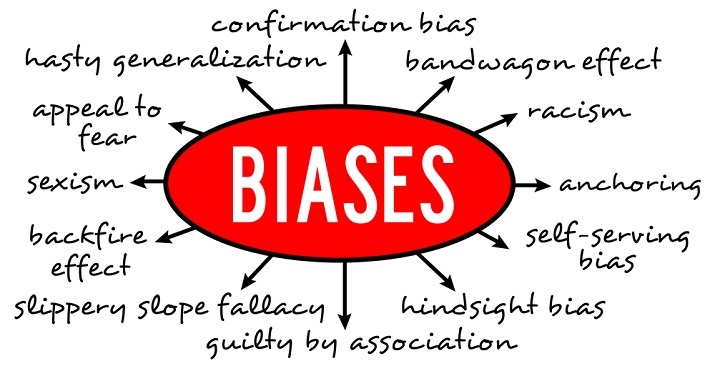
 Data Structure
Data Structure Networking
Networking RDBMS
RDBMS Operating System
Operating System Java
Java MS Excel
MS Excel iOS
iOS HTML
HTML CSS
CSS Android
Android Python
Python C Programming
C Programming C++
C++ C#
C# MongoDB
MongoDB MySQL
MySQL Javascript
Javascript PHP
PHP
- Selected Reading
- UPSC IAS Exams Notes
- Developer's Best Practices
- Questions and Answers
- Effective Resume Writing
- HR Interview Questions
- Computer Glossary
- Who is Who
How Cognitive Biases Impact Leadership and Business Outcomes?
Introduction
For every one of us, it is true. Humans are routine and habit-driven creatures. Any deviation from the established pattern is quickly avoided or vigorously rejected. Particularly in the way people work, change is present. It is a monumental task to bring about change within an organization. Nothing guarantees change more than introducing new technology or more effective procedures. People adapt, change, and finally change, which is how change occurs. But some are obstinate. We all prefer to stick with what we are familiar with.

Before we delve into understanding how this might impact leadership and business outcomes. Let us first try and understand what exactly is cognitive bias.
What is Cognitive Bias?
Cognitive biases are systematic thought patterns or errors in judgment brought on by the constraints and shortcuts in human cognition. Our judgment, perception, and thinking can all be impacted by these biases, which frequently result in incorrect or nonsensical judgments. Cognitive biases are a normal component of human reasoning and can happen unconsciously. Our experiences, emotions, social environment, and evolutionary predispositions are just a few of the variables that affect them. While these biases may have provided certain adaptive advantages in particular circumstances, they can also result in mistakes and mental distortions.
Psychologists have recognized different forms of cognitive. Let us here identify certain cognitive biases and understand how they might affect leadership and business outcomes.
How Conscious Bias Impacts Leadership and Business Outcomes
Every leader aspires to develop and promote a culture that values cooperation, community, and trust. Unconscious biases, though, maybe your company's downfall and threaten the culture you've worked so hard to build. Unconscious prejudice at workplace can influence decision-making, affect leadership judgment, and prevent from attracting the best talent to your company. However, it is by understanding how to confront their cognitive biases, modify their behaviors through sustainable change, and assist their leaders and managers in doing the same, leaders may endeavor to create the ideal workplace environment.
Cognitive Biases' Impact on Team Culture
When leaders are creating a team, one significant way cognitive bias can affect team culture. People who share their values and way of thinking are more likely to be hired, on average. If the team leader has put together a group of people that are too similar to one another, the creativity and effectiveness of the team may be hampered. Cognitive biases have the potential to cause significant, multi-level organizational failures if leaders and team members fail to identify them as soon as they occur. When considering common investor behavioral biases, it is simple to understand how a lapse in judgment or blind spot could put a business in great financial danger.
Types of Cognitive Biases and Their Effects
Let us understand some types of cognitive biases and their effects.
Confirmation Biases
The propensity to disregard or devalue data that challenges preexisting beliefs or opinions in favor of information that confirms such beliefs or opinions is known as confirmation bias. Confirmation bias can hinder the assessment of competing opinions, fresh concepts, and potential threats, which can be harmful to effective leadership and business decision-making. Because they are unable to perceive the big picture, leaders may develop tunnel vision, make poor strategic judgments, and miss opportunities.
Anchoring Biases
When making assessments or decisions, people are prone to anchoring bias, which is the propensity to place a lot of weight on the first piece of information they come across. Anchoring bias can cause skewed estimates of market circumstances, pricing, or project costs in the business world. Leaders may fail to effectively revise their initial estimations or forecasts in light of new facts, causing inefficient resource allocation.
Availability Biases
The propensity to exaggerate the significance or likelihood of events depending on their ease of recall or availability in memory is known as the availability bias. This bias can influence decision-making in management and business by giving more weight to current or vivid information than more pertinent but harder-to-access information. For instance, a leader could make poor decisions if they base their decisions on anecdotal evidence or notable success stories rather than completing in-depth research or taking into account wider industry trends.
Overconfidence Biases
The overconfidence bias refers to an excessive amount of self-confidence in one's skills, knowledge, or judgment. Overconfident leaders may overestimate their expertise, undervalue hazards, and create unrealistic expectations. This bias may result in inadequate risk management, a lack of emergency preparation, and an inability to adjust to changing conditions, which could influence the overall business outcomes.
Loss Aversion Biases
Loss aversion is the bias that makes people significantly prefer to avoid losses over achieving comparable rewards. This bias can lead to risk aversion and a reluctance to accept required changes or novel ideas in leadership and business. To maintain growth and competitiveness in fast-moving markets, leaders may be unduly cautious, delaying critical expenditures or strategic changes.
What Strategies Can Leaders Use to Combat Cognitive Biases at Work?
One of the most effective strategies leaders may employ to combat unconscious cognitive biases at work is critical thinking. Also important is awareness. Making decisions with less passion and extra weight can lead to better judgment. You need to be careful to obtain input from other team members and purposefully argue various viewpoints before making a decision. By doing so, you can avoid the primary decision-makers' implicit prejudices.
Conclusion
Although many leaders possess exceptional talent and expertise, unconscious cognitive biases may prevent them (and their company) from making decisions that are of high quality and fostering teamwork. This may harm not only the company but also its employees. By knowing how to counteract cognitive biases, leaders can create the perfect atmosphere and develop a culture that people want to be a part of?one that promotes trust, community, and collaboration.

